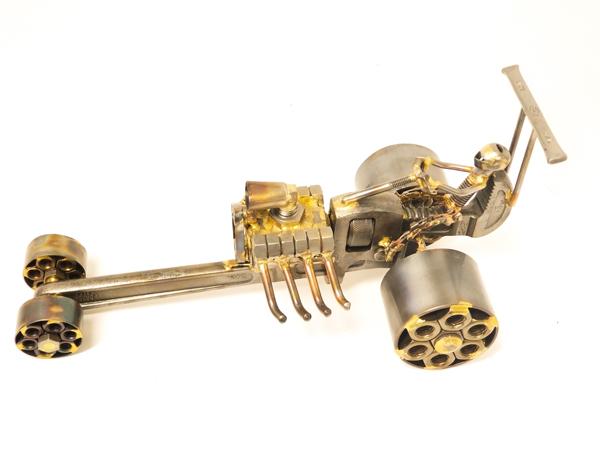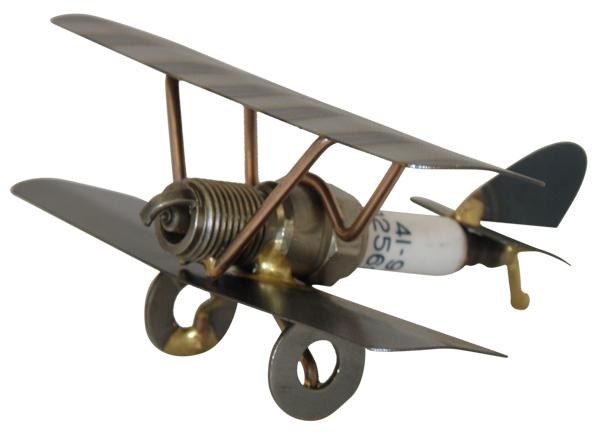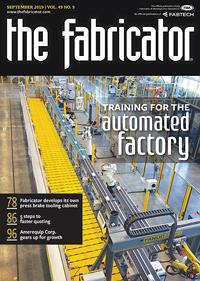- FMA
- The Fabricator
- FABTECH
- Canadian Metalworking
Categories
- Additive Manufacturing
- Aluminum Welding
- Arc Welding
- Assembly and Joining
- Automation and Robotics
- Bending and Forming
- Consumables
- Cutting and Weld Prep
- Electric Vehicles
- En Español
- Finishing
- Hydroforming
- Laser Cutting
- Laser Welding
- Machining
- Manufacturing Software
- Materials Handling
- Metals/Materials
- Oxyfuel Cutting
- Plasma Cutting
- Power Tools
- Punching and Other Holemaking
- Roll Forming
- Safety
- Sawing
- Shearing
- Shop Management
- Testing and Measuring
- Tube and Pipe Fabrication
- Tube and Pipe Production
- Waterjet Cutting
Industry Directory
Webcasts
Podcasts
FAB 40
Advertise
Subscribe
Account Login
Search
Small-scale metal sculptures appeal to large geographic market
Idaho metal fabricator, artist finds a niche throughout all 50 states
- By Eric Lundin
- September 7, 2019
- Article
- Arc Welding

Based on a pipe wrench, this dragster is an old-school design, one in which the driver sits behind the engine. Just 1 percent or so of Rock Creek Metal Craft’s sales are unique, one-of-a-kind items like this one.
To get started in making a living making metal sculptures, you don’t need much more than some scrap metal and some old, cast-off objects—say, a few spark plugs, a couple handfuls of fasteners, and maybe a beat-up tool or two—some fabricating equipment, and a little ingenuity. Generate a few ideas, make a few parts, do a little welding, and presto! You have a sculpture.
In the case of Rock Creek Metal Craft, Hansen, Idaho, the founder had all that and a lot of ingenuity. A mechanical engineer who retired from Boeing Corp., Jack Nuckols opened a small machining and welding shop in 1969. In addition to doing job shop work, he was the sort of craftsman who, quite literally, could turn trash into treasure.
“He’d get a hold of some scrap and put together a steam engine or a Stirling engine, and it would run for years without a problem,” said Rob Nuckols, Jack’s son and owner of Rock Creek Metal Craft. “I doubt you could find a finer engineer on the west side of the Mississippi, or on the east side, for that matter.”
The elder Nuckols tried his hand at fabricating small sculptures, starting with a mouse on skis and a few other such items. His wife, Rae, sold the items at a local gift shop, and before long they realized they were onto something good.
“Within five years, they were selling these items in all 50 states,” Nuckols said. While the company always has done some retail sales, the bulk of the revenue comes from wholesale arrangements with gift shops and other retailers.
The Business of Running a Fabrication Business
While the elder Nuckols enjoyed the creative aspect and developed many, many designs—the website lists more than 500 items—he balanced that with an extremely disciplined approach to running the business.
“If you look at two of the figures we make, such as fisherman and a banjo player, you’ll see that the legs are the same,” Rob said. They’re not just similar; they’re the same. As the business grew, the company decreased its reliance on scrap pieces and leftovers—other than for making occasional one-of-a-kind items—and transitioned to using new materials.
“Dad made benders, tooling, and jigs and developed specific instructions for making each component,” Nuckols said. That might sound overzealous, but even then, a U.S. craftsman who wanted to make a nice living had to rely on a few mass production techniques to compete against imports from low-wage countries.
And a nice living it is.
“The business took in about $500,000 annually 15 years ago,” Nuckols said. No business is bulletproof, but Rock Creek has fared pretty well even as the internet has made the industry more competitive, and a setback in a key market didn’t help. Sales in New Orleans, once a lucrative outlet for Rock Creek’s musical figures, took a hit in 2005 in the wake of Hurricane Katrina, and that market still hasn’t fully rebounded for Rock Creek.
Still, it’s a robust business, founded on a strong foundation that Rob’s parents built before they passed. Orders are steady; welders continue to drop in weekly, delivering finished sculptures and picking up new orders; and while Nuckols considers selling the business, he continues to work the phone, calling gift shops near and far—including those in southern Louisiana—to see if they’re interested in any of 526 unique figurines fashioned from small amounts of metal, common hardware items, and ingenuity.
About the Author

Eric Lundin
2135 Point Blvd
Elgin, IL 60123
815-227-8262
Eric Lundin worked on The Tube & Pipe Journal from 2000 to 2022.
subscribe now

The Fabricator is North America's leading magazine for the metal forming and fabricating industry. The magazine delivers the news, technical articles, and case histories that enable fabricators to do their jobs more efficiently. The Fabricator has served the industry since 1970.
start your free subscription- Stay connected from anywhere

Easily access valuable industry resources now with full access to the digital edition of The Fabricator.

Easily access valuable industry resources now with full access to the digital edition of The Welder.

Easily access valuable industry resources now with full access to the digital edition of The Tube and Pipe Journal.
- Podcasting
- Podcast:
- The Fabricator Podcast
- Published:
- 04/16/2024
- Running Time:
- 63:29
In this episode of The Fabricator Podcast, Caleb Chamberlain, co-founder and CEO of OSH Cut, discusses his company’s...
- Trending Articles
Tips for creating sheet metal tubes with perforations

JM Steel triples capacity for solar energy projects at Pennsylvania facility

Are two heads better than one in fiber laser cutting?

Supporting the metal fabricating industry through FMA

Omco Solar opens second Alabama manufacturing facility

- Industry Events
16th Annual Safety Conference
- April 30 - May 1, 2024
- Elgin,
Pipe and Tube Conference
- May 21 - 22, 2024
- Omaha, NE
World-Class Roll Forming Workshop
- June 5 - 6, 2024
- Louisville, KY
Advanced Laser Application Workshop
- June 25 - 27, 2024
- Novi, MI



























